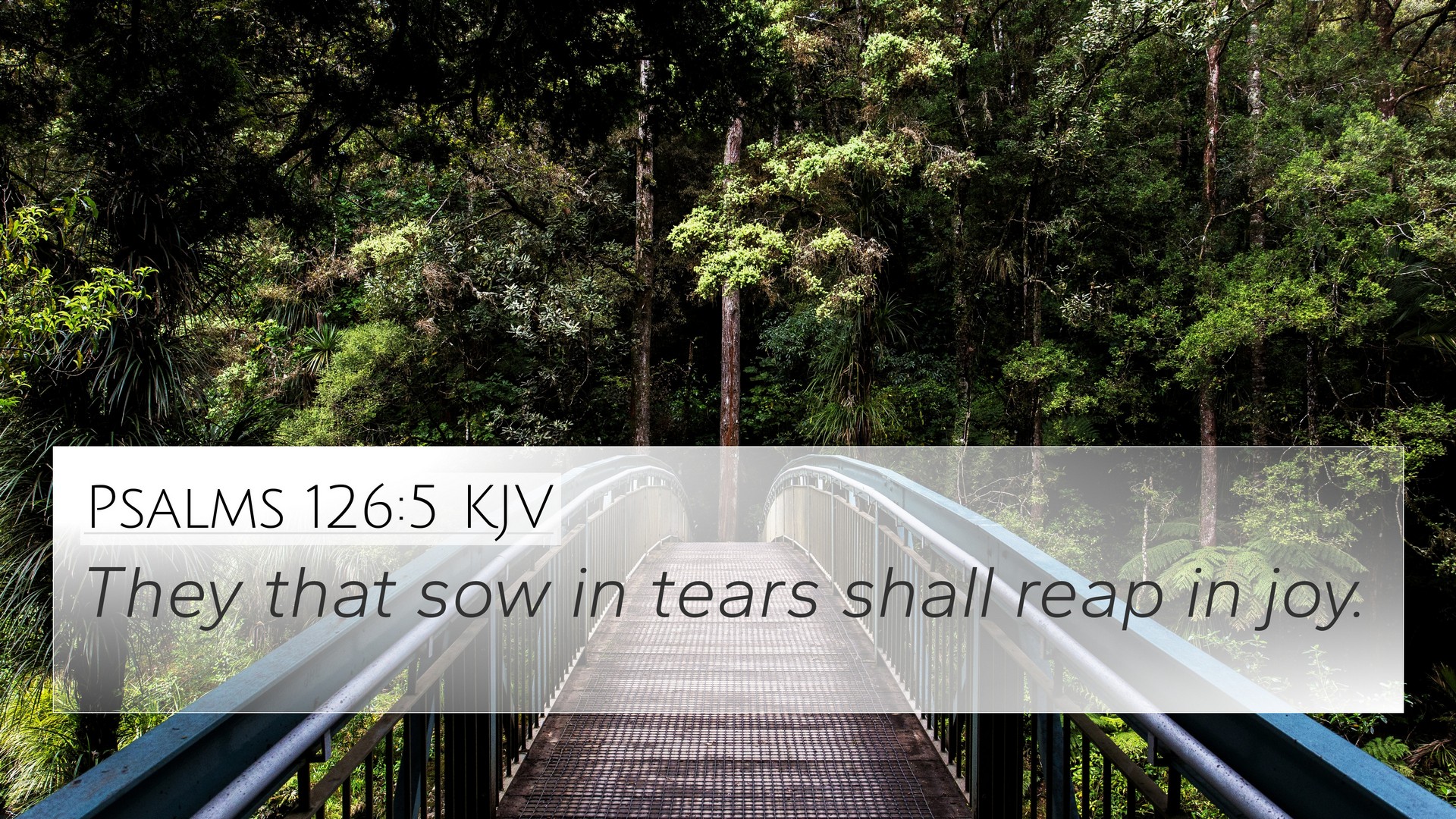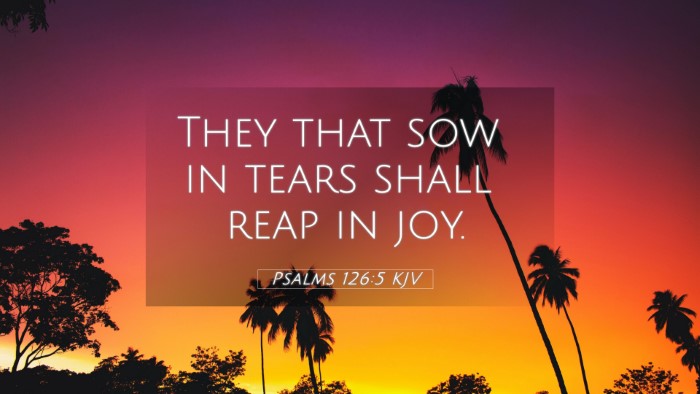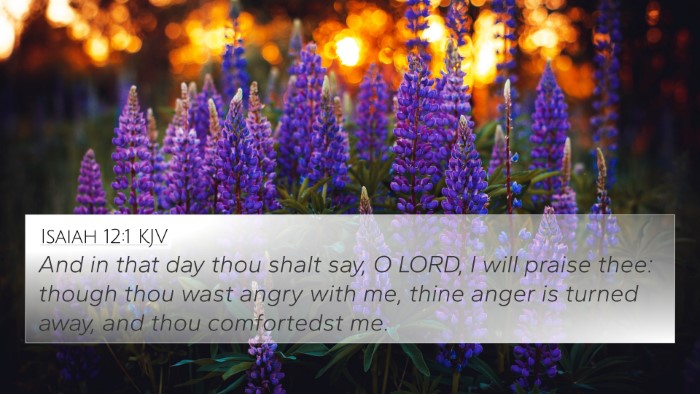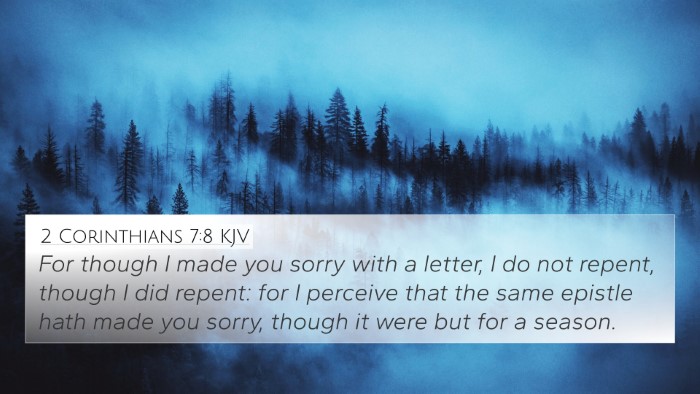Psalms 126:5 - Understanding the Verse and Its Meanings
Psalms 126:5 states: “They that sow in tears shall reap in joy.” This verse encapsulates a profound spiritual truth regarding the relationship between suffering and eventual joy. The themes addressed in this scripture are central to many scriptural teachings and resonate throughout both the Old and New Testaments.
Context and Overview
The context of Psalms 126 is that of returning exiles from Babylon, rejoicing in freedom and restoration. This psalm speaks to the shared human experience of sorrow and joy, underscoring the transitional nature of our circumstances.
Commentary Insights
- Matthew Henry: Henry emphasizes the essential connection between sorrow and eventual joy, interpreting "sow in tears" as an acknowledgment of life's hardships and the spiritual labor that often accompanies such periods. He writes that this sowing refers to acts of repentance and faith that are painful but lead to immense joy.
- Albert Barnes: Barnes provides a practical interpretation, suggesting that the tears shed in sorrow often yield a harvest of joy. He notes that this can refer to both earthly rewards and spiritual blessings, encouraging believers to trust in God's promise of restoration for those who experience despair.
- Adam Clarke: Clarke expands on the idea of sowing and reaping, suggesting that the metaphor highlights the cycles of life. He connects this to the doctrine of divine retribution and grace, positing that those who have endured trials with faith will be rewarded with joy that reflects the intensity of their previous trials.
Connections and Cross-References
This verse not only stands alone but also connects with various scripture passages that resonate with its message about the relationship between sorrow and joy.
Key Cross-References:
- 2 Corinthians 1:3-4: This passage speaks of comfort in tribulations, indicating that God provides comfort to those who face sorrow.
- Galatians 6:7-9: The principles of sowing and reaping are echoed here, emphasizing that perseverance and good works lead to a bountiful harvest.
- Matthew 5:4: "Blessed are they that mourn: for they shall be comforted" reflects the blessing that comes to those who experience mourning.
- Revelation 21:4: This verse provides a picture of eternal joy in the absence of suffering, linking our current sufferings to future joys.
- James 1:2-4: Encourages believers to count their trials as joy, supporting the notion that endurance in trials leads to spiritual maturity.
- Romans 8:18: Correlates present sufferings with future glory, reinforcing the belief that the weight of current trials will be outweighed by the joy that lies ahead.
- Psalms 30:5: "Weeping may endure for a night, but joy comes in the morning," aligns closely with the thematic elements found in Psalms 126:5.
Thematic Connections in Scripture
The overall theme of sowing and reaping, particularly regarding sorrow leading to joy, can be further explored through various terms that reveal their connections within the Biblical text:
- Scriptural cross-referencing: Enables believers to find relationships between different verses that bolster the understanding and application of Biblical truths.
- Thematic Bible verse connections: Helps uncover deeper meanings tied to enduring hardship and the promise of joy.
- Connecting Old and New Testament: Through examining parallel teachings of sorrow and restoration found in different parts of the Bible.
Conclusion
In conclusion, Psalms 126:5 serves as a powerful reminder of the transformative nature of our experiences. The insights from Matthew Henry, Albert Barnes, and Adam Clarke collectively provide a deeper understanding of this scripture, highlighting the importance of faith through trials. For believers seeking to understand how this verse connects with other scriptural texts, various tools for Bible cross-referencing can be invaluable.
As you reflect on this verse, consider how the idea of sowing in tears leading to reaping in joy can be applied within your own life’s journey. Embrace the hope that emerges from a faith anchored in God’s promises, understanding that connections through inter-Biblical dialogue can deepen your insight and spiritual growth.












